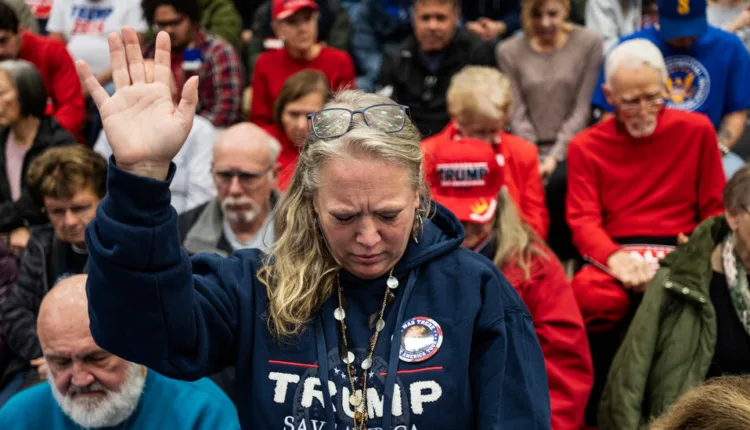
Donald Trump is Engaging with a Unique Category of Evangelical Voter
TL/DR –
Karen Johnson, a 67-year-old who identifies as an evangelical Christian, no longer attends church but still maintains her faith through prayer and consuming religious and political content online. White evangelical Christian voters have historically supported Republican candidates, but religion scholars suggest that the term “evangelical” has evolved to denote a cultural and political identity, rather than a religious one. According to a 2021 analysis by Pew Research Center, white Americans were more likely to identify as “evangelical” during former President Donald Trump’s presidency, even as overall rates of church attendance declined.
Evangelicalism Reimagined: Shifts in Faith and Politics
The 67-year-old evangelical Christian, Karen Johnson, transitioned from being a Sunday school teacher to a solitary believer who engages with God through prayer and online platforms. Johnson is an exemplar of a growing trend in which faith is increasingly politicized and individuals draw their guidance from politicians and social media personalities.
Johnson’s unswerving support for Donald Trump, despite his counterintuitive relationship with evangelicals, reflects a significant shift in the evangelical community. Notably, their focus has moved away from church attendance and certain doctrinal issues, towards embracing a cultural and political identity. This shift has been particularly pronounced among white Americans who have identified as “evangelical” during Trump’s presidency even as church attendance rates decline.
The upcoming Republican caucuses in Iowa will be a litmus test for Trump’s continuing influence over evangelicals. Governor Ron DeSantis has been proactive in courting Iowa evangelicals, securing the support of prominent evangelical figures, and advocating strongly for anti-abortion measures. Despite this, Trump held a 25-point lead over DeSantis among evangelical voters in a recent Iowa Poll.
Shifting Church Attendance Patterns
The religious landscape in the U.S has been changing with church membership and attendance on the decline for decades. The decline, once predominantly affecting liberal mainline Protestant denominations, now impacts self-identified evangelical church attendance too. This has been described by Michael Graham, the author of “The Great Dechurching,” as the largest and fastest religious shift in the nation’s history.
This transformative shift has been palpable in Iowa, where church adherence fell sharply from 2010 to 2020. Despite this decline, many Iowans continue to identify as white Christians. The disconnection from organized religion doesn’t necessarily signify a departure from faith. Many continue to identify strongly as Christians even if they do not regularly attend church.
Politics and Religion: New Cause, New Leaders
The politicization of the evangelical identity has reshaped how politicians seek to appeal to these voters. Notably, cultural Christians are less focused on traditional religious-right issues like abortion and pornography, instead prioritizing issues like immigration and the economy.
The shifts in evangelical identity have also undermined the influence of traditional evangelical leaders. A new class of influencers has emerged: social media personalities, podcasters, and politicians who, like Trump, embody evangelicalism as an identity rather than a religious practice. This shift is indicative of an evolving evangelical landscape where political identity and cultural alignment often take precedence over shared religious doctrine.
—
Read More US Political News
